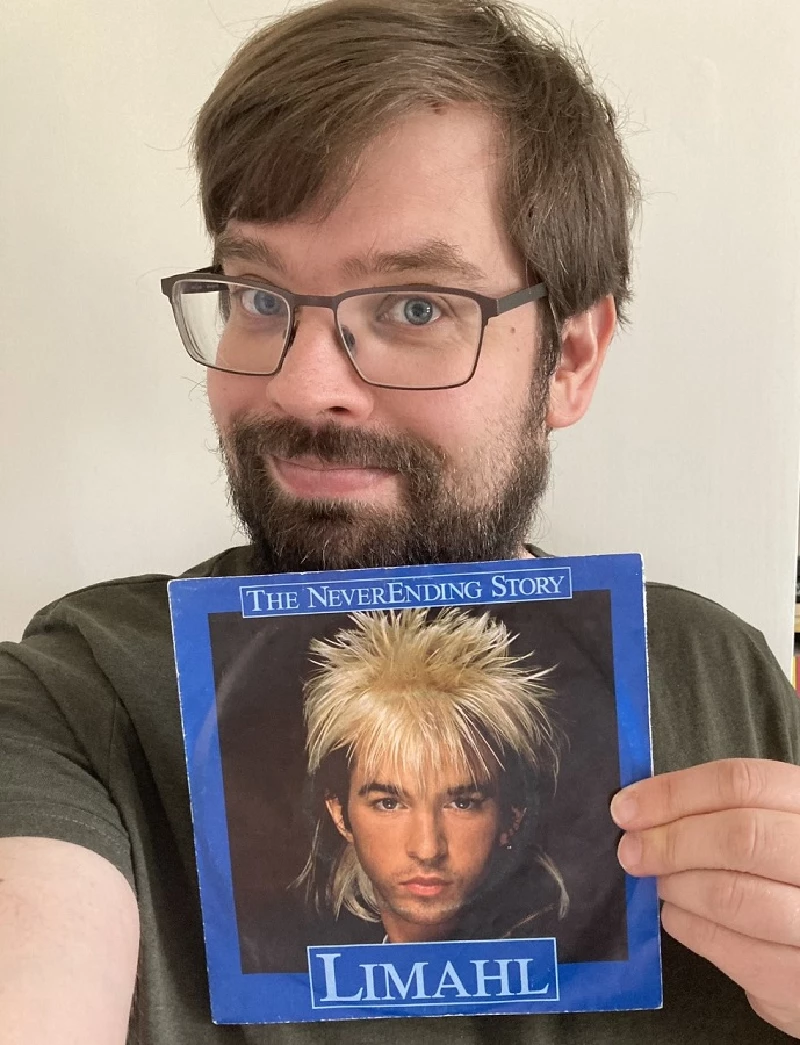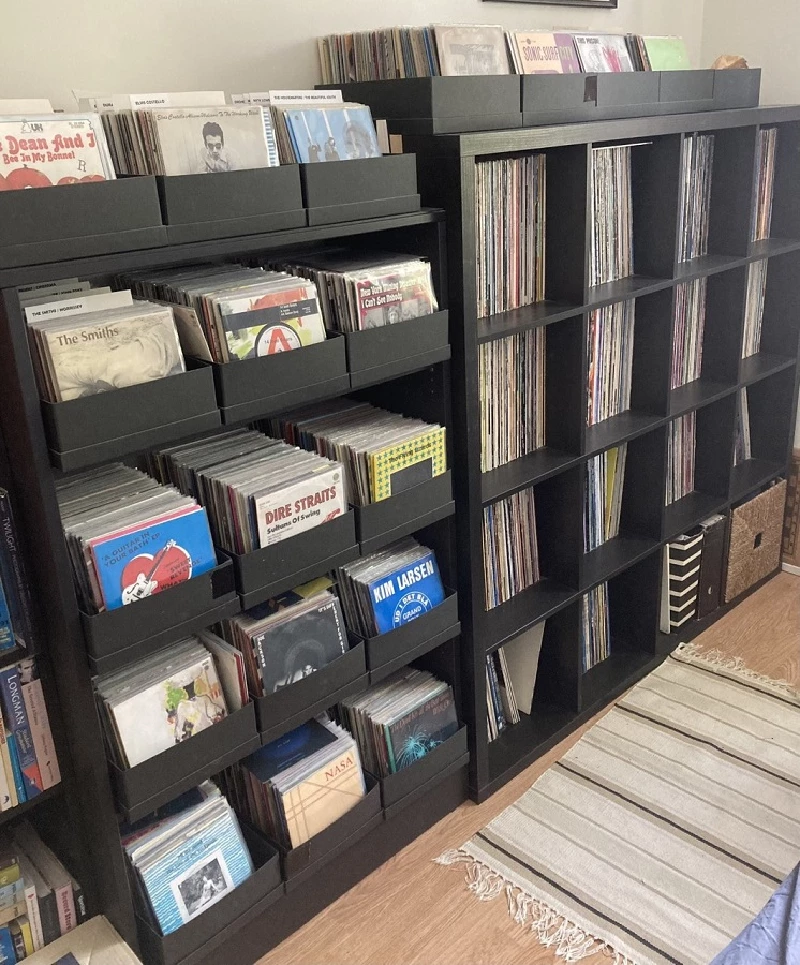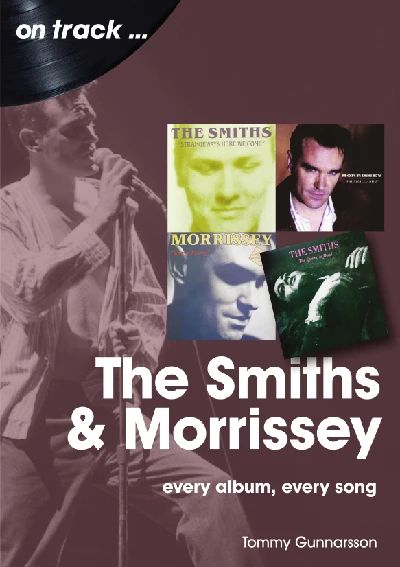Tommy Gunnarsson - A Life in Music
by Cila Warncke
published: 21 / 6 / 2022

intro
In her series, 'A Life in Music', in which she speaks to Pennyblackmusic staff about how music has affected and influenced them, Cila Warncke talks to our Swedish writer Tommy Gunnarsson.
When not penning reviews for Pennyblackmusic, Stockholm-based Tommy Gunnarsson works in the social security department that financially supports parents caring for sick children. He mentions this matter-of-factly, as if such a humane arrangement were unremarkable, which it is in his native Sweden. Perhaps exposure to pragmatic, state-sanctioned compassion has long-term consequences, because Tommy chuckles frequently, despite the nagging remains of a cough. He exudes a cheery enthusiasm for music that is unmingled with surprise. Of course it is a source of joy. Why wouldn’t it be? His tone is infectious, an invitation to trawl one’s own happy musical memories Here, Tommy shares his thoughts on tricky interviews, acid house and the hazards of record collecting. What musical culture(s) did you identify with most strongly as a young person? First was synthpop. My brother, who is four years older, introduced me to Erasure and Depeche Mode. There was a big scene in Sweden at the time but I was seven, too young to be part of a subculture. My dad also had a lot of records but I don’t remember him playing them. We mostly listened to the radio, which played Swedish pop music, UK hits. How has your relationship with music evolved? I began buying records when I was seven, because of my brother. He would take me into the city at the weekends and we would run around the record shops. In the 90s, I discarded synthpop and started listening to guitar bands – Brit Pop, The Smiths. Around that time, I started writing for music magazines in Sweden. When did you go from a casual fan to music being something that defined you? Around seven or eight, I guess. I was the only kid in my class who liked music that way. My brother and I had a game; we used to play B-sides to each other and compete to see who could name the A-side. What are the biggest differences in your musical taste between ‘then’ and ‘now’? Initially, I didn’t listen to guitar bands at all, just synthesizer bands. Now I listen to a lot of guitar bands. Discovering REM in the early 90s was a turning point. What attracts you to an artist/band? Lyrics, definitely. I like a lot of songs with stupid lyrics, but the great ones stand out. When a band seems to be nice people, I appreciate that. One of my favourite bands is Magnetic Fields. Even though Stephin Merritt is supposed to be grumpy, I think he’s nice. REM too, they seem really nice Have you ever gone into an interview thinking the band was nice and been surprised? There was an email interview with Bid, the frontperson in the Monochrome Set. I sent a bunch of what I thought were really good questions and he just answered "yes" or "no". Once, I interviewed Kent, one of the biggest Swedish bands ever. The singer [Joakim Berg] is – it’s widely known – a bit of a prick. I had a brief chat with him and, well, he was. Has anyone been nicer than you expected? I mostly think they will be nice, and they are nice. What’s a band you used to love that makes you cringe now? In the late 80s my brother and I listened into acid house, which was big in the UK. When I hear it now, I can’t understand why. It’s horrible. Who’s an artist you came to late but now love unreservedly? The Magnetic Fields. My friends all loved '69 Love Songs' but I didn’t get it at the time. Now I love them. I have tickets to see them soon, for the sixth time. Three gigs that meant something extra-special? REM, Stockholm, 1998: They had stopped touring but did a small fan club tour. There were maybe 50 or 60 people there and the show was broadcast live on Swedish TV, it was amazing. Nick Lowe, Stockholm, 2014: This was my first time to see Nick Lowe live, and I went with my Dad. Nick Lowe was one of his favourite artists, and he’s become one of mine. Jackson Browne, Stockholm, 2015: Browne is another of my Dad’s favourites. The last thing he did, before he passed away, was buy me the tickets. He had cancer and knew he wouldn’t make it to the gig, but he wanted me to go. When and how did you get involved with Pennyblackmusic? I used to buy a lot of records from Pennyblack because they were quite cheap, and I always wanted records. Around 2000 I saw a small ad on the website seeking writers. I’d never written about music in English before but thought, why not? I emailed John, reviewed an indie pop compilation and here I am, 22 years later. How would you characterise a) the site and b) your contributions? One of the best things about Pennyblack is that it covers known and totally unknown acts, old and new, which is unique. It’s driven by enthusiasm, which shows in the articles. Nowadays I mostly write reviews of compilations, mainly because I don’t listen to a lot of new music. I used to do a lot of interviews as well. Why does music writing matter? When it comes to reviewing new music, I’m not sure it does any more. In the old days, you had to spend money on a CD or an LP, so you wanted to read a review. Now you just stream it and move on. Compilation reviews can be useful though, box sets are expensive, it’s good to know if you should buy it. When it comes to articles, though, music writing matters a lot. Personally, I like to read interviews with artists and bands, or retrospectives about a particular scene or album. What is one of your most memorable Pennyblack interviews? One of the first interviews I did was with Malcolm Eden, the lyricist and singer in 80s indie-pop band McCarthy. He hadn’t given an interview since they split up in 1990. In 2001, I found his name on a French chess website. I had no idea if it was him, so I emailed and asked, ‘are you the Malcolm Eden?’ What’s an image that encapsulates your life in music? My record collection is my whole life in music in one place. I have between 16,000 and 20,000 records, organised alphabetically. I have moved house a few times, the records are the hardest thing. Take 5… 1. The first song you remember? ‘Bette Davis Eyes’ by Kim Carnes 2. A wedding song? ‘The Book of Love’ by the Magnetic Fields or Nick Cave ‘Into My Arms’ 3. A funeral song? ‘God Only Knows’ by the Beach Boys. 4. The one artist you’d most like to interview? Stephin Merritt of the Magnetic Fields. 5. The song you never, never get tired of… ‘Love Goes On’ by The Go-Betweens. I wonder why it wasn’t a worldwide hit. It should have been. It’s perfect.
Also In A Life in Music
Article Links:-
https://pennyblackmusic.co.uk/Home/Details?id=11065https://pennyblackmusic.co.uk/Home/Details?id=10489
https://pennyblackmusic.co.uk/Home/Details?id=10490
Play in YouTube:-
Picture Gallery:-

profiles |
|
The Smiths and Morrissey: Every Album, Every Song (2022) |

|
| Pennyblack’s own Tommy Gunnarsson takes on The Smiths and Morrissey’s entire back catalogue. in his first book Fiona Hutchings rolls up her sleeves and dives in. |
most viewed articles
current edition
Spear Of Destiny - InterviewRobert Forster - Interview
Fiona Hutchings - Interview
When Rivers Meet - Waterfront, Norwich, 29/5/2025
Carl Ewens - David Bowie 1964 to 1982 On Track: Every Album, Every Song
Brian Wilson - Ten Songs That Made Me Love...
Chris Wade - Interview
Pistol Daisys - Waterfront, Norwich, 29/5/2025
Credits - ARC, Liverpool, 17/5.2025
Gary Numan - Berserker
previous editions
Heavenly - P.U.N.K. Girl EPBoomtown Rats - Ten Songs That Made Me Love....
Barrie Barlow - Interview
Manic Street Preachers - (Gig of a Lifetime) Millennium Stadium, Cardiff, December 1999
Oasis - Oasis, Earl's Court, London, 1995
Dwina Gibb - Interview
Pixies - Ten Songs That Made Me Love...
David Paton - Magic: The David Paton Story
Chuck Prophet - Ten Songs That Made Me Love...
Sound - Interview with Bi Marshall Part 1
most viewed reviews
current edition
Peter Doolan - I Am a Tree Rooted to the Spot and a Snake Moves Around Me,in a CircleGarbage - Let All That We Imagine Be The Light
Vinny Peculiar - Things Too Long Left Unsaid
Little Simz - Lotus
John McKay - Sixes and #Sevens
Suzanne Vega - Flying With Angels
HAIM - I Quit
Morcheeba - Escape The Chaos
Vultures - Liz Kershaw Session 16.06.88
Billy Nomates - Metalhorse
Pennyblackmusic Regular Contributors
Adrian Janes
Amanda J. Window
Andrew Twambley
Anthony Dhanendran
Benjamin Howarth
Cila Warncke
Daniel Cressey
Darren Aston
Dastardly
Dave Goodwin
Denzil Watson
Dominic B. Simpson
Eoghan Lyng
Fiona Hutchings
Harry Sherriff
Helen Tipping
Jamie Rowland
John Clarkson
Julie Cruickshank
Kimberly Bright
Lisa Torem
Maarten Schiethart